What emotional memories do you carry from your childhood? For many adults, a connection with nature is part of those memories. From playing outdoors, experiencing the thrill of climbing a tree for the first time, to countless activities involving natural elements. Unfortunately, these experiences are becoming increasingly rare, distancing young people from nature and making it harder for them to build such memories.
The replacement of nature experiences with confinement and excessive screen time has radically transformed the lifestyle of children and teenagers. According to the NGO Children and Nature, young people living in urban contexts watch more than five hours of TV per day and spend 90% of their time indoors. The time spent playing outside is only one hour per week.
For Maria Isabel Barros, a childhood and nature specialist at the Instituto Alana, this confinement has interrupted a natural development process. “This confinement that children are subjected to is very recent and has severe impacts on their health and overall development. As a species, we evolved outdoors—not just playing, but coexisting with natural environments. This need is in our DNA,” she explains.
Marina Mello, a pedagogue, partner at Colégio Ética São Carlos in the interior of São Paulo, and coordinator of school programs at Outward Bound Brasil (OBB), highlights the urgency of reclaiming our sense of belonging as part of nature. “We need to understand that nature is not just a resource—nature is us.”
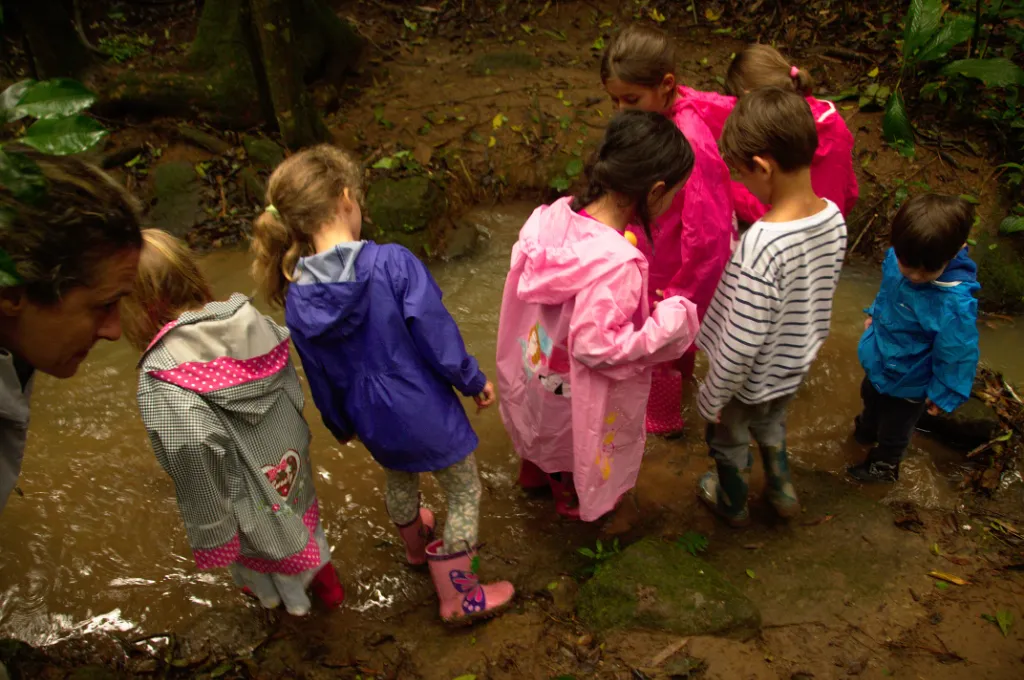
Children in nature during the OBB Kids Program. Photo: Outward Bound Brasil
How disconnecting from nature affects children and teenagers
The profound impacts of nature deprivation on children’s and teenagers’ physical, emotional, and social health led journalist Richard Louv to coin the term Nature-Deficit Disorder, introduced in his book *Last Child in the Woods*.
Among the harmful effects of this disconnection are increased sedentary behavior, anxiety, depression, and delays in cognitive and emotional development.
Physical impacts of nature deprivation
According to Maria Isabel, we are witnessing an epidemic of childhood myopia, linked to the lack of opportunities to gaze at the horizon. One-third of Brazilian children are overweight or obese. “Sports are not the only way for children to engage in physical activities. When they play outdoors, they move naturally, and that represents an important way to stay healthy.”
Another physical issue caused by excessive screen time is its impact on children’s and teenagers’ posture.
Cognitive drawbacks
Children today are more hyperactive and less focused, affecting their sleep, increasing irritability, and weakening social bonds, since outdoor play is more creative.
Psychologist, neuropsychologist, and Ph.D. in Sciences from the USP School of Medicine, Andrea Lorena da Costa Stravogiannis, highlights that excessive screen use causes delays in cognitive development, especially in children’s social interactions. “The more time spent on screens, the less social repertoire a child develops, as it is a passive activity.”
The acquisition of language and the ability to focus are also impacted. “Being glued to screens limits children’s vocabulary and makes it harder for them to read books or engage in activities that require greater concentration,” explains Andrea.
Impacts on mental health and emotional development
Lack of interaction with nature can increase the risk of mental health issues, including anxiety and depression. “Since the 1980s, children have increasingly been raised in a protective bubble, distancing themselves from outdoor play. From 2010 onward, with everyone connected to their smartphones, mental health deteriorated significantly, leading to issues like self-harm, depression, and suicide attempts,” says Andreas Martin, Executive Director of Outward Bound Brasil (OBB), an NGO that is part of a global network of Outdoor Experiential Learning Schools.
This new—and troubling—reality has forced OBB, which arrived in Brazil in 2000, to rethink some of the practices in its programs. “We noticed that we can no longer use the same distances and weights as we did ten years ago. Today, young people have less physical endurance and resilience. They are also emotionally weaker and get frustrated more easily.”
Benefits of real nature experiences for children
In his book, Richard Louv also argues that nature experiences are essential for healthy development, both emotionally and physically.
The simplest activities, such as playing in a park with soil, sand, and other natural elements, not only promote physical and mental well-being but also stimulate creativity, imagination, social integration, and help prevent anxiety and depression.
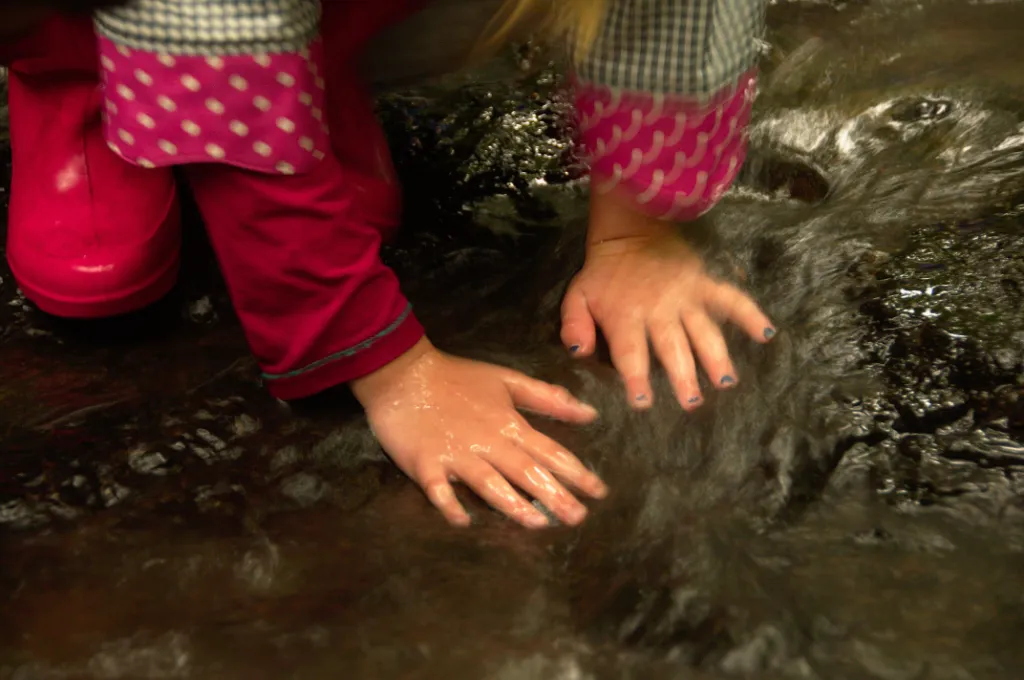
Child playing in nature during the OBB Kids Program. Photo: Outward Bound Brasil
“When we take our bodies into nature, we bring them to the environment they were designed for. Since the mid-1980s, the Japanese have studied what happens physiologically when we walk in a park or go into a forest. All stress indicators, cortisol levels, blood pressure, and heart rate decrease,” says Andreas, from OBB.
Development of socio-emotional skills through nature experiences
The real and challenging experiences lived in nature have the potential to unlock the full potential of children, teenagers, and adults, and Outward Bound is a global reference on the subject.
Founded in 1944, it is present in 35 countries and serves approximately 150,000 people annually. Its founder, Kurt Hahn, was a pioneer of experiential education, combining education and training to develop young people holistically. “He said, as early as 1920, that teenagers possess far more skills and abilities than society allows them to develop,” explains Andreas Martin.
In Brazil, OBB has already reached more than 24,000 people. The experiential learning cycle methodology starts with experience in nature. First comes the challenge, then the theory. “We explain what needs to be done and let children and teenagers do it. There will be mistakes, successes, and attempts until they get it right. In my opinion, experiential education is powerful precisely because you are immersed in the experience. When you connect emotions with learning, the process happens faster and more deeply,” explains Andreas.
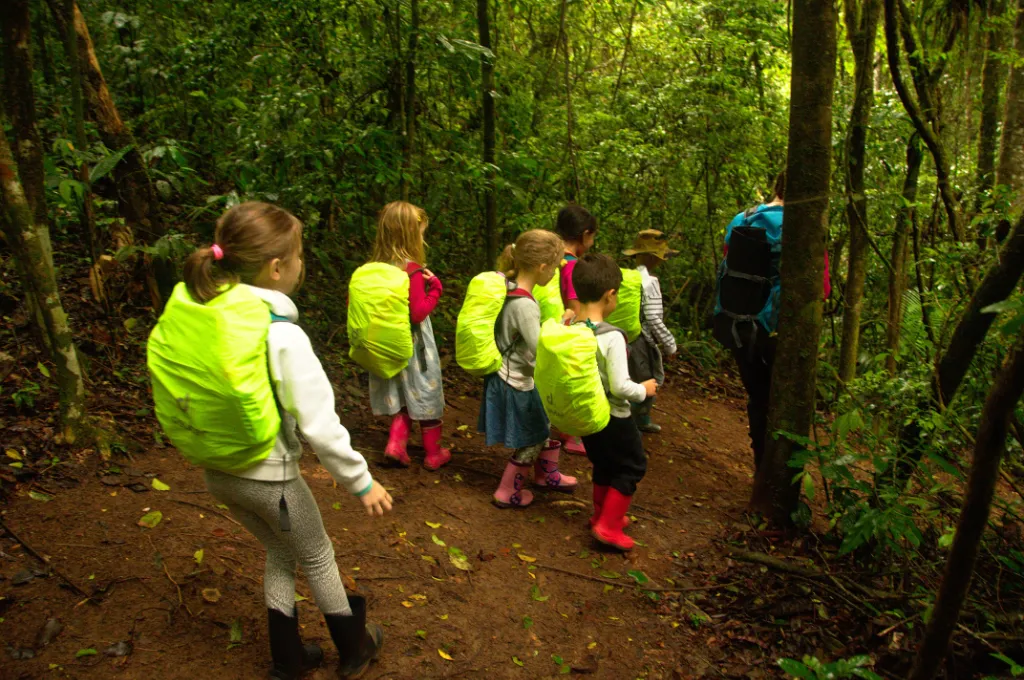
In OBB programs, after challenging experiences in nature that help develop interpersonal skills, there is a reflection moment based on the facts and emotions experienced. “If we worked well as a team and communicated effectively, now it is a fact: we can do it. How can we take this experience to school, the workplace, the community, and family life?”
Marina Mello, OBB’s school programs coordinator, explains that through experiential learning, it becomes easier to understand emotions. “After helping a friend who was panicking during a nature activity, forming a connection with them, a child understands compassion and empathy. They can even point out on their body where they felt that emotion, just like fear and anger. The body experience precedes understanding.”
For Marina, being in nature is a facilitator for developing socio-emotional skills, something that can be difficult to achieve in schools due to rules and time constraints. “Nature shields us from urban time; it creates a bubble. There, the only thing that matters is what I am doing at that moment. The experiences are real: I feel fear when I see a mountain, I think I can’t climb it, but when I reach the top, I discover that I was capable. Nature gives you this feedback naturally.”
Increased autonomy and strengthened family bonds
During the OBB Kids program, designed for families with children aged 3 to 6, parents are naturally encouraged to reflect on how the lack of outdoor experiences impacts their children’s development. “On the first day, they stay very close, watching over their children during the hike. On the second day, children become more independent, as parents themselves feel more relaxed. They take part in acqua trekking, walking through a creek where the water can reach their waists,” says Andreas.
The free experimentation process changes parents’ perceptions of their children’s abilities. “They realize that instead of telling children what to do, they can let them experience it, offering support when needed and encouraging them to try overcoming obstacles. During free playtime, children decide what they want to do, exercising their autonomy.”
Eric Fonseca and his 6-year-old daughter, Luiza, participated in OBB Kids. His initial goal was simply to fulfill his daughter’s wish to go camping, but the experience far exceeded his expectations. “In a short time, interacting with other children and nature, Luiza was already comfortable, eager to explore the environment. When she saw a vine, she not only wanted to try swinging on it, but she also showed it to other children, who then formed a line to take turns.”
In another memorable moment, Eric saw Luiza’s insecurity transform into joy. “We had to cross a small river section. At first, she was hesitant, but soon she was smiling, screaming, and jumping into the water, signaling that she felt safe and completely at ease.”
Eric also highlights the deep bond formed with his daughter during the experience, in addition to her growing sense of autonomy as he watched her help set up the tent, explore the trail, and interact with the campfire. “I stood back and observed her adding wood to the fire, discovering that stones can put out flames. When we returned from the camp, Luiza was already leading the construction of a campfire with her cousins.”
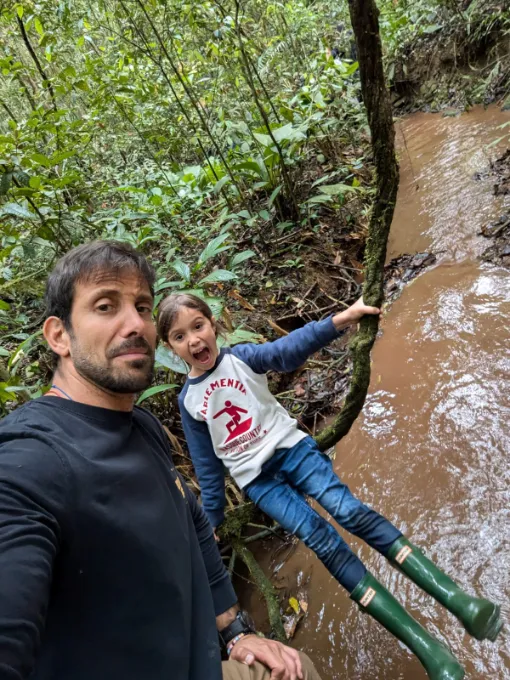
Eric and Luiza
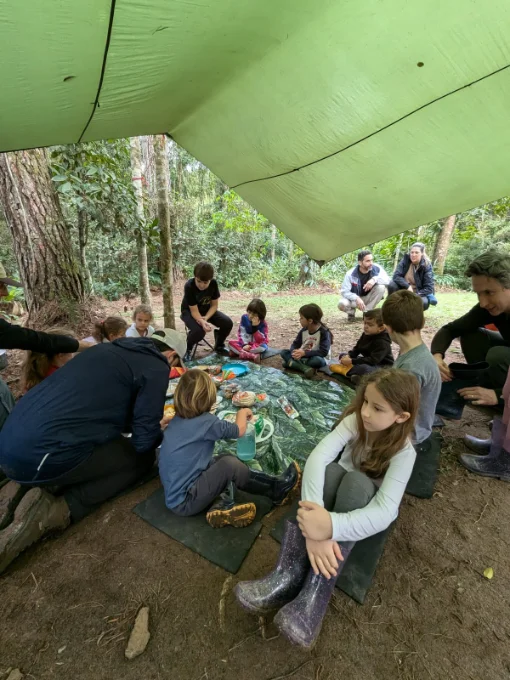
Children and parents at OBB Kids
Andreas explains that in another program, Pais & Filhos, aimed at families with children between 7 and 14 years old, only the children and teenagers receive instruction on orientation and navigation techniques. “This way, we reverse the roles of who guides whom. We do the same with food preparation: the children cook for the parents.”
The role reversal awakens parents’ awareness that it is possible to delegate tasks, giving their children more autonomy and allowing them to experiment freely. “The reactions are surprising when parents see their children hiking through the woods, overcoming challenges, cooking, carrying weight. If they’re handling it so well with limited resources, imagine how much of an impact that has when they return to the urban environment,” says Andreas.
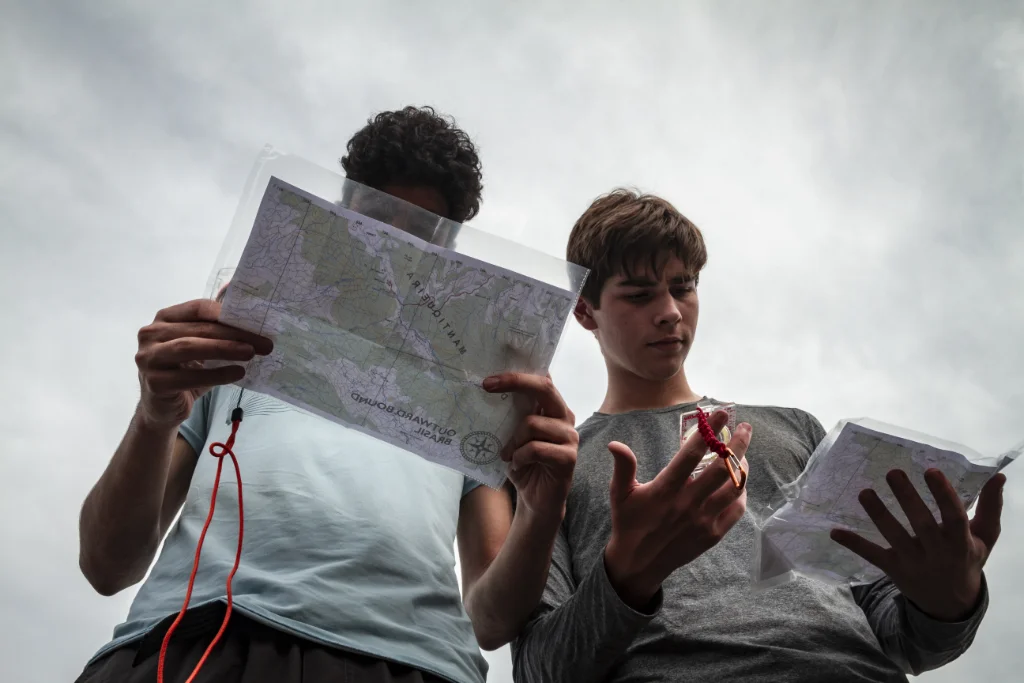
Teenagers learning orientation and navigation techniques with a map and compass. Photo: OBB
Environmental Awareness in Children and Teenagers Through Their Bond with Nature
A crucial issue highlighted by Maria Isabel from the Instituto Alana is the emotional bond that children form with nature and open spaces from an early age. “Studies clearly show that children who grow up playing outdoors carry a lifelong commitment to environmental conservation. Faced with socio-environmental crises, we need to foster this connection. We only preserve what we know, and we only know it by experiencing it firsthand.”
Marina Mello shares the same view: “We suffer from nature blindness. Before, I would look at a forest and just see trees. With these experiences, we learn to see and appreciate things that were always there but that we hadn’t noticed before. This creates a different kind of care, which naturally translates into our daily lives.”
One of the experiences that impacts participants in OBB programs is the awareness of the amount of waste we generate. “It’s one thing to see pictures of landfills in textbooks, but it’s completely different to carry your own waste during expeditions. In nature, young people learn to reduce waste, handle it properly, clean and dry contaminated waste before recycling, and compact what must be carried until the journey’s end,” says Marina.
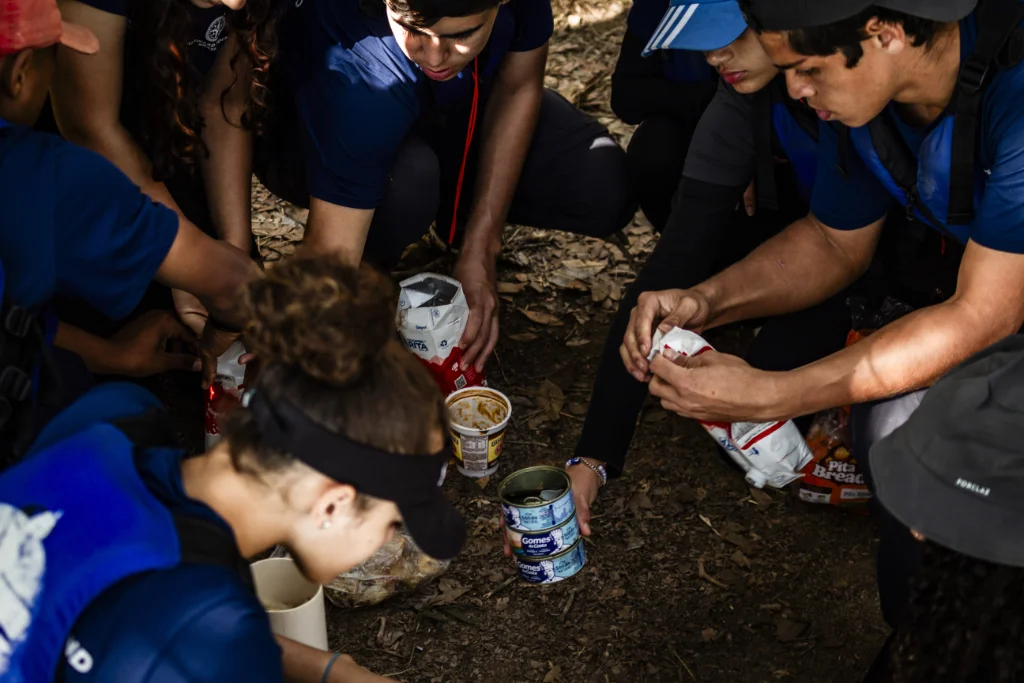
Children learning about waste management in nature. Photo: OBB
Discover OBB Programs
OBB offers a variety of programs, but the mission remains the same: to awaken people’s potential through challenging nature experiences and help them see themselves differently. “One of the biggest barriers to personal growth is a lack of self-belief. When you shift this mindset, you enter a virtuous cycle of development,” says Andreas Martins.
OBB Kids: Designed for families with children aged 3 to 6, this program offers a weekend camping experience in a beautiful forest just an hour from São Paulo city.
Parents & Children: A camping experience for families with children aged 7 to 14, in Brazil’s breathtaking natural landscapes.
OBB GO!: Created for preteens aged 11 to 14, this is a safe and fun introduction to outdoor experiential learning. “It’s a five-day program during the holidays, featuring climbing, trekking, canyoning, and canoeing,” says Andreas.
OBB Challenge: Targeted at teenagers aged 15 to 18, the OBB Challenge is a bold and transformative experience in outdoor learning. The program consists of 10 days in the Papagaio Mountain Range.
OBB also offers exclusive programs for adults, as well as projects aimed at companies, schools, and NGOs. Gear Tips Club subscribers have exclusive discounts on OBB programs.
Other programs that take babies and children on nature experiences
When children grow up in a nature-rich environment, they develop a lifelong connection to the outdoors, inspiring other families to follow the same path. Here are three initiatives that have turned personal nature experiences into transformative opportunities for families.
Natureza de Criança: Handcrafted Programs in Brazil’s Most Beautiful Natural Destinations
Isabela Abreu combined her love for nature with her professional experience and motherhood to create Natureza de Criança. Her goal is to help families with children experience unforgettable adventures in Brazil’s most stunning natural locations, such as the states of Amazon and Maranhão.
During her career, Isabela worked for a luxury travel agency, taking people to remote locations in Brazil. She also became a certified instructor at OBB, where she helped create the OBB Kids program after the birth of her daughter, Clara, in 2011.
“The outdoor world has always been part of my life, and I wanted it to be part of Clara’s as well. I wanted her to experience camping, playing, paddling—everything I already loved doing in nature. I began creating opportunities for her to have these experiences, inviting friends to join in. Over time, this gained momentum and spread by word of mouth.”
Connecting with Local Communities
All Natureza de Criança itineraries are designed by Isabela, who has been visiting these destinations for over 20 years, building meaningful relationships with local communities. “At Natureza de Criança, we bring together groups of children and adults to experience authentic interactions with people in remote locations. It’s a unique experience.”
One of the programs offered in the Amazon is a community-based tourism trip in the Tumbira Community. “We gather families who want to take their children out of their urban bubble and immerse them in a variety of activities with local children from river communities.” The same approach is applied in the state of Maranhão, in Santo Amaro do Maranhão.
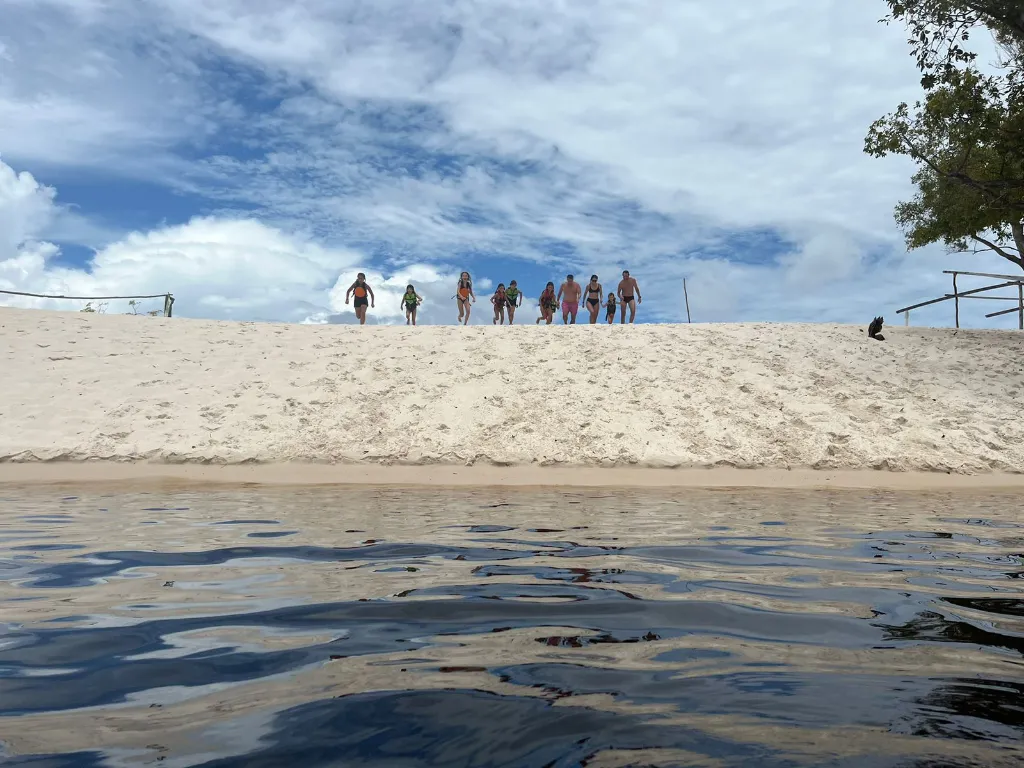
Photo: Natureza de Criança
“We don’t travel just to admire nature’s beauty. We genuinely value people’s beauty as well. In the Amazon, we stay in simple lodges. In Maranhão, we sleep in hammocks for a night in the National Park. These elements attract families who resonate with this style of travel.”
For Isabela, stepping out of the urban bubble helps children understand that Brazil is much bigger than the big cities and school routines. The connection with local communities fosters values about what truly matters. “We have the opportunity to see that these communities live simply, in houses made of exposed brick, and that’s perfectly fine. We don’t need to have everything to feel good. People are deeply moved by this experience. It’s not tourism just to see, but to live.”
Hands-on and sensory experiences in nature
As a Waldorf mother, Isabela has always engaged in hands-on crafts and learned the importance of these experiences for children’s cognitive development. Today, all Natureza de Criança programs include some form of manual activity using natural elements, such as building small boats and creating nature art panels.
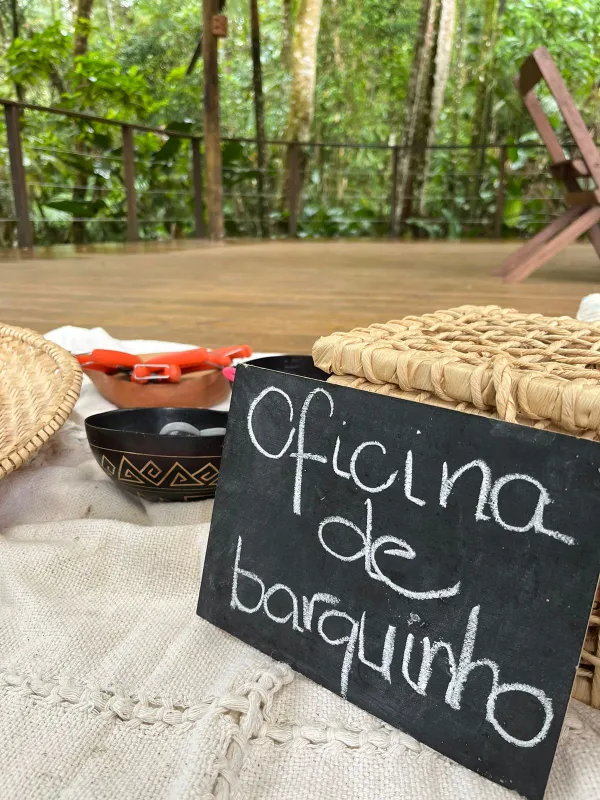
Photo: Natureza de Criança
Another key aspect of Natureza de Criança programs is stimulating all the senses. “When we’re on a trail, we ask children to feel the texture of the leaves, observe how each side is different, hug a tree, and smell the moss. It’s not just about vision—all senses play a role in a child’s connection with nature,” says Isabela, who is also the founder of an NGO for visually impaired individuals.
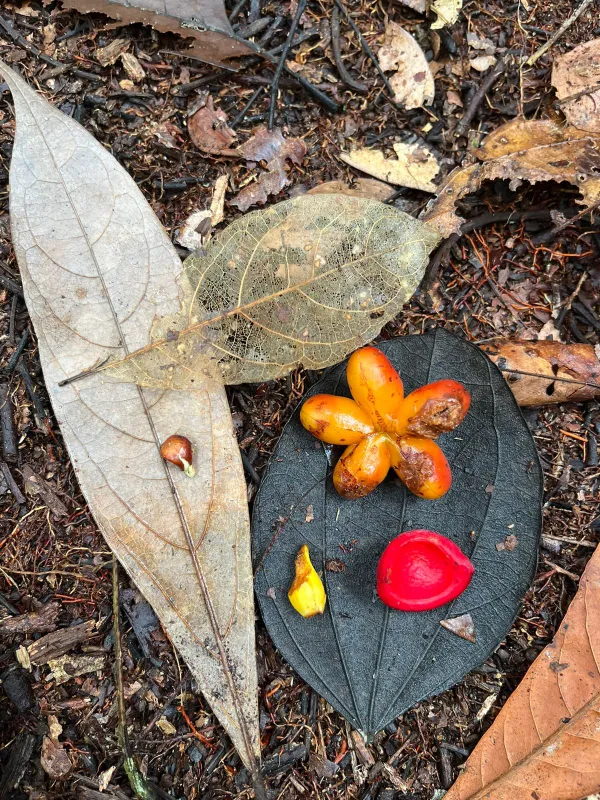
Photo: Natureza de Criança
Discover all the programs by Natureza de Criança on their website.
Cria Outdoor: Mountain Adventures with Babies and Children
Cria Outdoor was born organically. The couple Marcela and Fernando Tenório Barros were already avid adventurers, and mountain expeditions had always been part of their life together. When they found out they were expecting Gabi, they decided to continue exploring nature, hiking, and camping.
“Over time, we realized that children can be anywhere. We traveled extensively across Brazil, including remote areas, and even did some international trips. As we crossed deserts and villages, we saw mothers with children and homes with children’s clothes hanging on clotheslines. That’s when we decided to carry Gabi in a baby carrier for the first six months of her life, taking her on hikes and mountain treks. In fact, she was the first baby ever to reach many of these places,” says Marcela.
Fernando and Marcela, who were already sharing their nature experiences on Instagram with friends and family, soon caught the attention of other families who had the same purpose. “They wanted to go mountaineering with us to understand how to navigate these environments with a baby or young child,” explains Marcela, who now has two daughters.
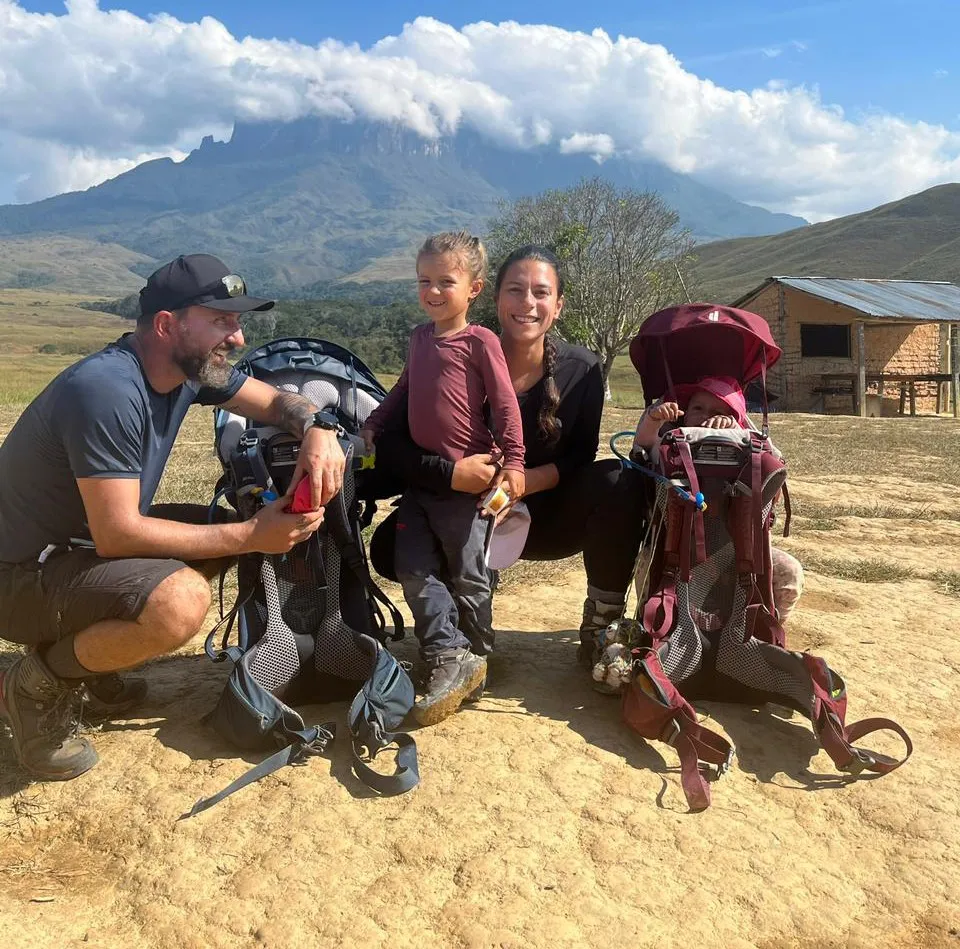
Marcela, Fernando, and their two daughters
The couple then began forming small groups and brought in environmental engineer Pedro Nogueira, an expert in working with children in nature. That’s how Cria Outdoor was officially founded in 2022, after several successful group experiences. “The best way to show families that it’s possible to continue adventuring after having children was to take them by the hand and guide them into nature with us. We professionalized ourselves to follow this path,” says Fernando.
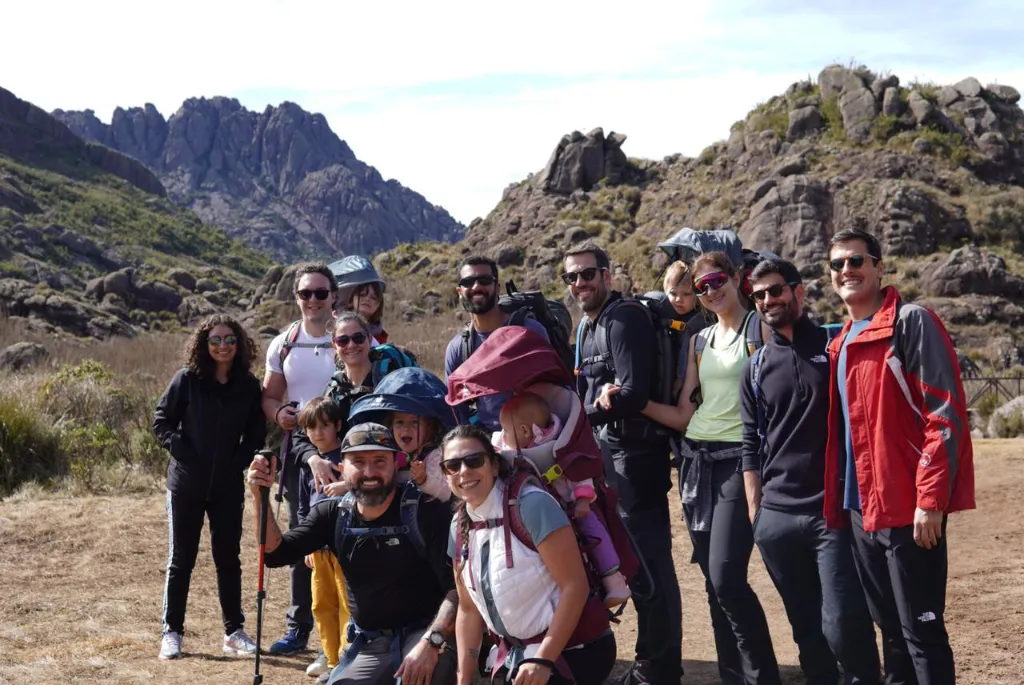
Photo: Cria Outdoor
Since its inception, Cria Outdoor has been committed to showing families that mountaineering and connecting children with nature go far beyond physical and emotional benefits. These experiences strengthen family bonds and improve relationships between couples. Marcela shares that she has also received testimonials from many women who experienced personal empowerment after becoming mothers, feeling at their full potential while connected to nature with their children.
About the Itineraries
Cria Outdoor offers traditional weekend and holiday itineraries to Ilhabela, Itatiaia, and Paraty, as well as special routes to destinations like Patagonia (Argentina), Mount Roraima, and Chapada Diamantina, which require a longer duration. “These are places we already knew and believed had the potential to provide incredible experiences for families, even though they are not traditionally considered destinations for babies and children,” explains Fernando.
A Community for Adventurous Families
In addition to Cria Outdoor, Marcela runs the “Lá Fora com Eles” community on WhatsApp, which brings together families from all over Brazil and even other countries. The message exchanges in the group have already led to in-person meetups. At a hotel in Itatiaia, 100 people gathered, including children, babies, and adults, proving that the search for a connection with nature is a growing trend for all ages.
Sua Casa é o Mundo: A Group for Families with Mini Mountaineers
When Bia Carvalho and Edinho Ramon met, they quickly realized they shared two passions: outdoor sports and a love for nature. Together, they launched the Sua Casa é o Mundo blog to share their outdoor experiences. Later, they created an Instagram profile. From there, the couple began producing films, conducting research, and writing scientific articles on socio-emotional development through nature exposure, eventually publishing a book. “We’ve always shared our experiences as a form of encouragement, showing that nature adventures are possible for everyone,” says Bia.
When Maya, the couple’s daughter, was born in 2020, Bia and Edinho continued their nature-based lifestyle, introducing their daughter to outdoor adventures from infancy.
After presenting a study at the Scientific Mountain Climbing Symposium and participating in a discussion with families about the lack of children in outdoor activities, they came up with the idea of forming a small group to take kids to the mountains. “The Mini Mountaineers group started on WhatsApp, with parents and classmates from Maya’s school, and it worked so well that it expanded to other families. We realized that all families needed was a little encouragement to feel confident, and that’s exactly what the group provides,” says Bia.
Today, the Mini Mountaineers group has around 200 members, and monthly meetups are held for free in Rio de Janeiro, always in familiar locations chosen by the couple.
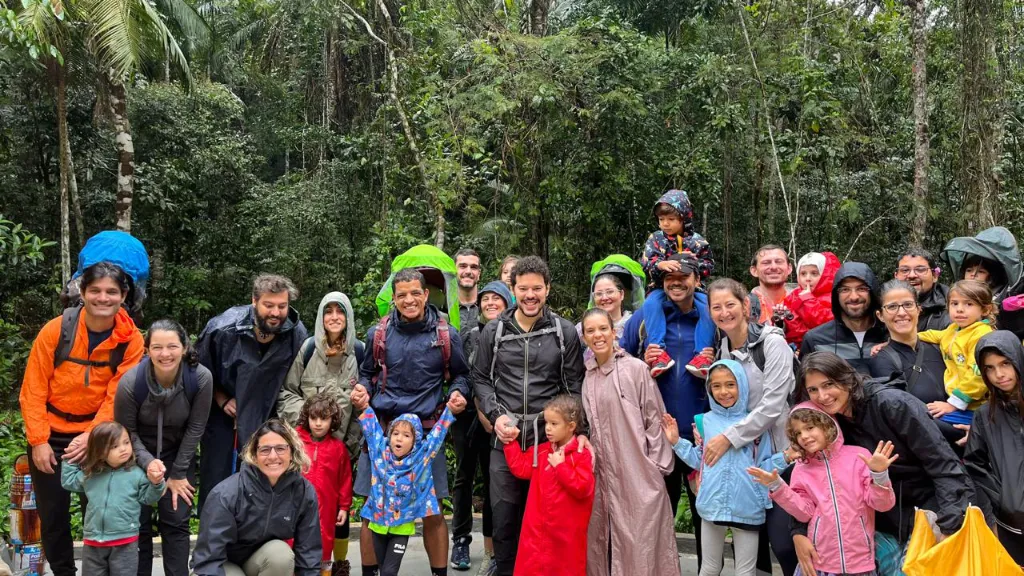
In addition to the monthly hikes, Mini Mountaineers organizes a nature trip every semester to a mountain destination. “During our last meetup, we gathered 20 families at Três Picos State Park, where there were few lodges and a camping area. We had a campfire circle, hiked 9 km of trails, played, and cooked together. Everyone was connected, but each person experienced nature in their own way. In just one year, our group grew from three to twenty families,” celebrates Bia.
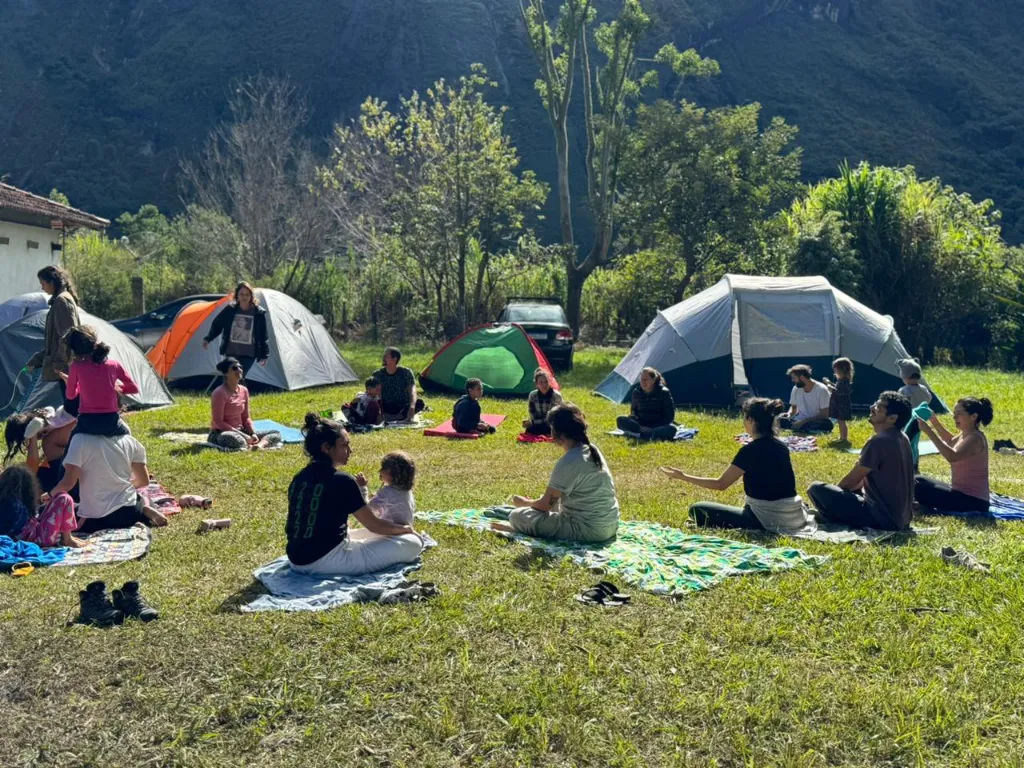
Families at Três Picos State Park
On Gear Tips, you’ll find a series of articles about children in nature, written by Edinho Ramon. In addition, on Gear Tips Club Academy, subscribers have full access to the online course Infância Outdoor, developed by Bia and Edinho, which aims to promote nature as a space of discovery, offering resources that contribute to child development.
Inclusion programs that connect children and youth with nature
OBB develops a series of programs aimed at people who don’t have easy access to green areas, national and state parks. “There’s huge potential among people in these communities who were just waiting for an opportunity to recognize themselves, and from that point on, start to face life differently, be bolder, seek more resources, and not give up so quickly,” says Andreas.
Azimute Program: free and designed for young people in situations of social and/or economic vulnerability. The goal is to support them in overcoming life and work challenges by offering the opportunity to develop their own projects, strengthen personal, social, cognitive, and productive skills, and inspire them to become agents of social transformation.
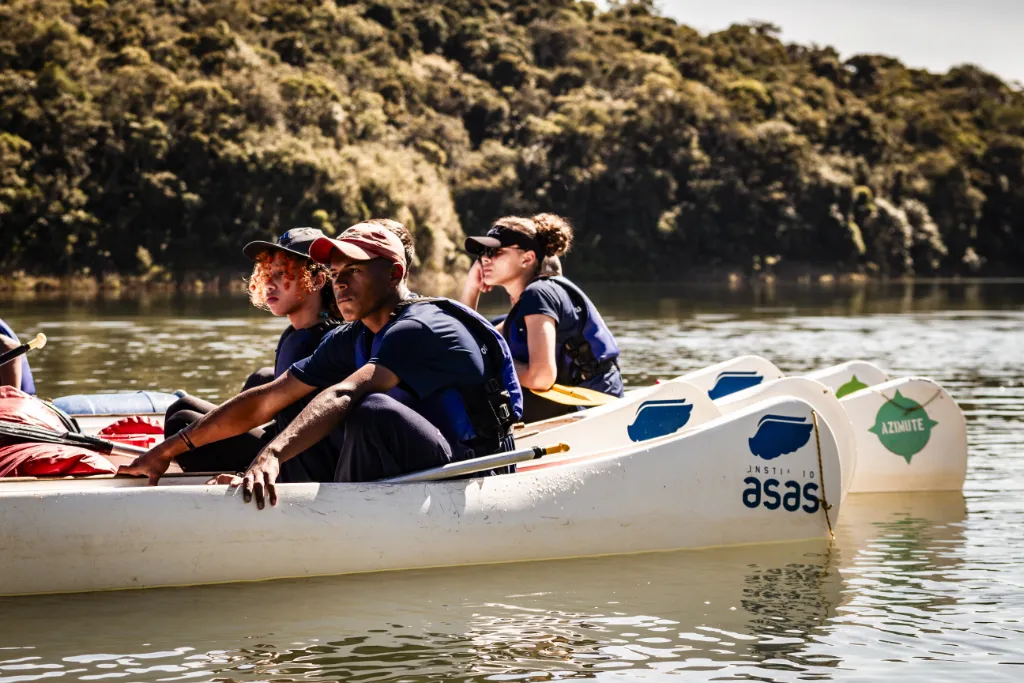
Azimute Program
Entorno Project: focused on high school students who live in regions of great natural beauty, such as São Bento do Sapucaí. They go on expeditions to understand that working in nature is also a career opportunity. Young people who participate in the Entorno Project have greater employability in their town, helping reduce rural exodus in these small communities.
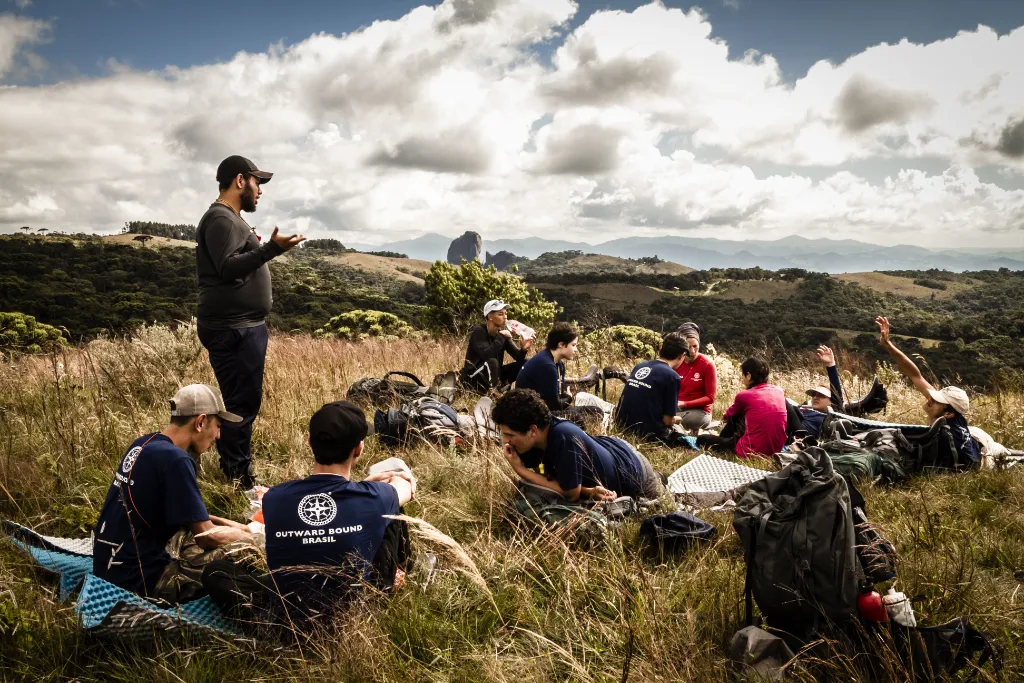
Entorno Program
In addition, OBB runs a program in partnership with the João Clemente Institute, focused on young people and adults with intellectual disabilities. It is a stationary program conducted in a controlled area to work on self-esteem and independence.
In Natureza de Criança, Isabela Abreu runs an inclusive program that brings together children with and without visual impairments. On a day of outdoor activities in a nature reserve in the Atlantic Forest, they share experiences, learn to paddle, swim in the river, hike through the forest, listen to storytelling, and engage in other playful activities in nature.
The program is endorsed by the Ministry of Citizenship and supported by the Sports Incentive Law. These experiences take place a few times a year, depending on funding.
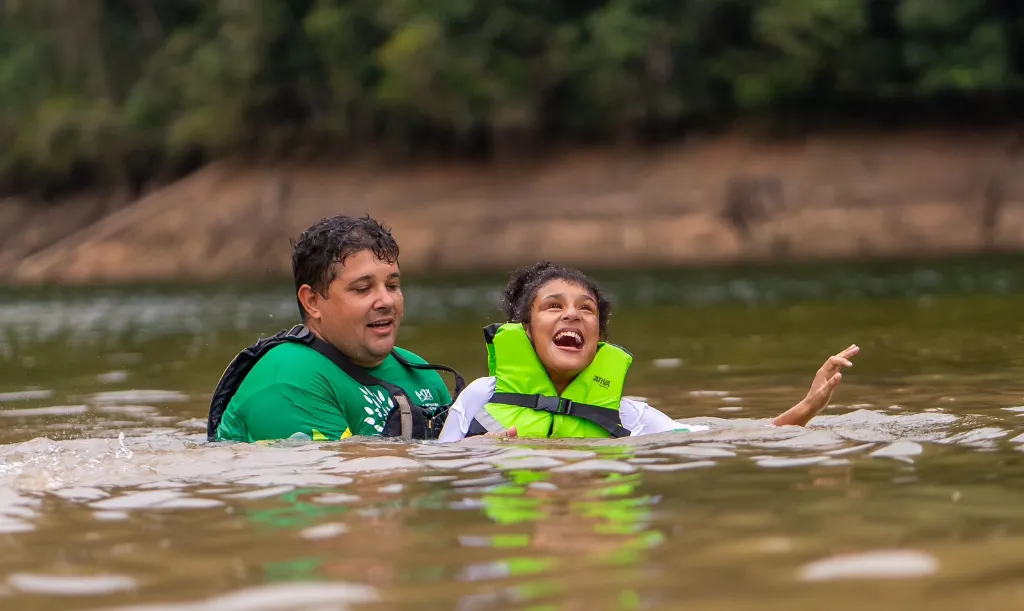
Inclusive Program – Natureza de Criança
The Role of Schools in Outdoor Learning
Although families play a crucial role in encouraging children and teenagers to connect with nature, schools also have a major responsibility in providing these experiences. “We often place all the responsibility on families, but at Instituto Alana, we believe that’s the wrong approach. Many sectors should and can take action, including schools,” says Maria Isabel.
A study conducted by Instituto Alana asked families where their children experience activities like climbing trees, making mud pies, and building forts with branches. The answer was unanimous: at school! “Families expect schools to provide opportunities for interaction and play, because once children are back home, it’s much harder—there’s less time, fewer social interactions, and little access to outdoor spaces. These experiences need to happen daily,” explains Maria Isabel.
One of the key initiatives at Instituto Alana is helping schools rethink their outdoor spaces, making them more natural and incorporating challenging activities. “We work to naturalize schoolyards, which not only benefits the children but also the schools themselves, as they need to adapt to climate challenges, such as increasing heat waves.”
Another crucial aspect for schools, according to Maria Isabel, is redefining pedagogical practices, removing unnecessary barriers, and maximizing outdoor learning time. Schools can even adopt public parks and squares as part of an integral education approach.
For pedagogue Marina Mello, using natural resources to foster child and youth development is essential. “It’s important to move beyond just academics and cognitive learning and recognize life as a convergence of multiple elements, with cognition being just one part of the whole. At our main school, we have jabuticaba (Brazilian fruit) and mango trees and plenty of green space.”
In Singapore, Outward Bound programs are part of the Ministry of Education. The government’s goal is to ensure that every high school student participates in at least one five-day outdoor program. “Singapore has a strong culture of investing in people, not only academically but also in socio-emotional development. Every year, around 50,000 students take part in these programs,” says Andreas.
In Brazil, OBB runs programs in schools and universities, aiming to enhance teamwork, foster respect for differences, and reduce student anxiety levels through nature immersion. The NGO also develops projects for public schools, with funding from companies interested in supporting children and youth development.
Would you like to learn more about the importance of children’s connection with nature? In Gear Tips Club, we have several videos featuring Andreas Martin from OBB.
This post is also available in: Português (Portuguese (Brazil)) Español (Spanish)
